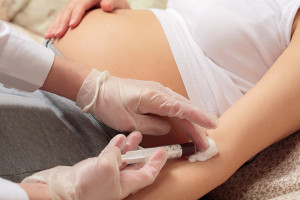 There are various options, both non-invasion and invasive, for Down Syndrome screening. Down Syndrome (DS) is a genetic disorder, also known as Trisomy 21, which causes lifelong mental and physical delays in development and increases the risk of other diseases. DS is present in approximately 1 out of 700 newborns. We offer the following screening options for all pregnancies, regardless of age, to help you make informed decisions about your pregnancy.
There are various options, both non-invasion and invasive, for Down Syndrome screening. Down Syndrome (DS) is a genetic disorder, also known as Trisomy 21, which causes lifelong mental and physical delays in development and increases the risk of other diseases. DS is present in approximately 1 out of 700 newborns. We offer the following screening options for all pregnancies, regardless of age, to help you make informed decisions about your pregnancy.
Nuchal Translucency:-This non-invasive screen helps assess if your baby is at an increased risk for Down Syndrome or Trisomy 18. Nuchal Translucency uses an ultrasound exam to measure the amount of fluid in the back of your baby?s neck. Typically, babies with either Down syndrome or Trisomy 18 tend to have more fluid than expected. This test will not provide a definitive diagnosis, but it will help you make a more informed decision about further testing. The screen is performed on pregnancies of 12-13 weeks.
AFP Tetra-This screen is a simple blood test that detects if your child is at an increased risk for Down syndrome, Trisomy 18, as well as open neural tube defects. Open neural tube defects, such as spina bifida and anencephaly, occur in about 1 out of 1,000 newborns and are caused by incomplete closure of a baby?s spinal cord. Again, this test is not diagnostic, but will help you assess if you would like further tests. The AFP Tetra test is offered on pregnancies of 15-20 weeks.
Harmony, MaterniT21, and verify Blood Tests-These three tests are newly developed, non-invasive detectors of fetal trisomies and sex chromosome abnormalities. A trisomy is a genetic irregularity in which there is a third copy of a chromosome instead of the expected 2 copies. These tests analyze DNA in maternal blood through a routine blood draw and are performed on pregnancies of 10 weeks or more.
Harmony, MaterniT1, and verify screen for Trisomy 21, which is linked to Down Syndrome as well as Trisomy 18 and Trisomy 13, Trisomy 21 is present in approximately 1 out of 700 newborns. Trisomy 18, also known as Edwards Syndrome, is present in about 1 out of 5,000 newborns. Trisomy 13, or Patau Syndrome, is present in about 1 out of 16,000 newborns. Both Edwards Syndrome and Patau Syndrome are associated with a high rate of miscarriage. Newborns with either Trisomy 18 or 13 have multiple birth defects and do not usually survive the first few months of life.
These tests work by measuring the relative amount of chromosomes in maternal blood, with a detection rate of up to 99%. These tests cannot be used with multiple pregnancies, such as twins, or with egg-donor pregnancies. The cost of the test ranges from $800 to $2200, before deductions
Amniocentesis-This is an invasive diagnostic test that detects chromosomal abnormalities, such as Down Syndrome, and neural tube defects. The procedure involves inserting a needle through the mother?s abdomen to remove a small amount of fluid from the sac that surrounds the baby. The fluid is then sent to a lab for genetic testing. This test is performed anytime after 15 weeks. Because amniocentesis is an invasive test, there is a small risk of miscarriage.
We also offer additional genetic tests to populations that may be at high risk for other diseases such as cystic fibrosis (CF), Tay-Sachs disease, or sickle cell anemia. Consult your doctor for testing recommendations.
Special Tests
As of September 1st, 2013, all pregnant women admitted to the hospital to begin delivery will be prompted for syphilis testing and illicit drug use screening. Informed consent will be given.
Ultrasounds
We recommend an ultrasound be completed between 20-22 weeks in the pregnancy to evaluate fetal anatomy. Additional ultrasounds will be performed based on the medical need. Ultrasounds will be performed in the office.
Additional Ultrasounds
We offer optional ultrasounds for a fee that are not covered by insurance. These include a gender scan at 16 weeks and a 4D ultrasound between 28-32 weeks. Many people enjoy these experiences, but please remember that these ultrasounds do not provide the physician with information about the well being of your baby and are purely for your enjoyment. Please check with our front desk staff for prices and scheduling.
Biophysical Profile
This is an ultrasound occasionally done after 32 weeks if necessary to check for fetal well being. It looks at the movement, breathing and tome of the baby in addition to evaluating the amount of amniotic fluid.
Non-Stress Test
This is another test of fetal well being that is occasionally done after 32 weeks if necessary. A monitor is placed on your abdomen and the pattern of your baby?s heart rate is evaluated for approximately 20 minutes.
The Rh Factor
We will test your blood for the Rh factor. If your blood type is Rh negative then you may be at risk for Rh disease, which affects about 10% of people. Rh disease is a pregnancy complication in which your immune system attacks the baby?s blood and can result in a life threatening situation for the baby if left unknown. Fortunately, it can be prevented with a shot called Rhogam which is given at 28 weeks and after delivery or anytime if vaginal bleeding occurs. If you are Rh negative contact our office immediately if you develop bleeding or trauma to your be4lly.